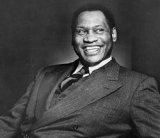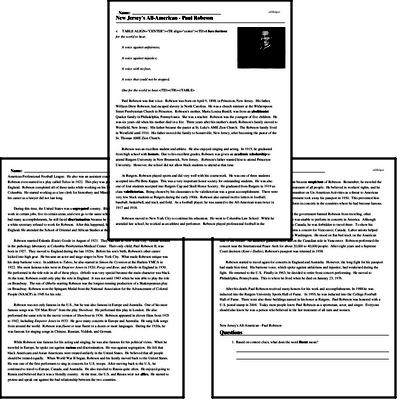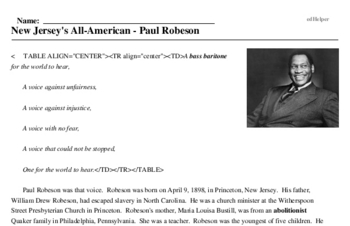New Jersey's All-American - Paul Robeson
Paul Robeson
Reading Comprehension for April 9
| A bass baritone for the world to hear, A voice against unfairness, A voice against injustice, A voice with no fear, A voice that could not be stopped, One for the world to hear. |
Paul Robeson was that voice. Robeson was born on April 9, 1898, in Princeton, New Jersey. His father, William Drew Robeson, had escaped slavery in North Carolina. He was a church minister at the Witherspoon Street Presbyterian Church in Princeton. Robeson's mother, Maria Louisa Bustill, was from an abolitionist Quaker family in Philadelphia, Pennsylvania. She was a teacher. Robeson was the youngest of five children. He was six years old when his mother died in a fire. Three years after his mother's death, Robeson's family moved to Westfield, New Jersey. His father became the pastor at St. Luke's AME Zion Church. The Robeson family lived in Westfield until 1910. His father moved the family to Somerville, New Jersey, after becoming the pastor of the St. Thomas AME Zion Church.
Robeson was an excellent student and athlete. He also enjoyed singing and acting. In 1915, he graduated from high school with honors. Due to his excellent grades, Robeson was given an academic scholarship to attend Rutgers University in New Brunswick, New Jersey. Robeson's father wanted him to attend Princeton University. However, the school did not allow black students to attend at that time.
At Rutgers, Robeson played sports and did very well with his coursework. He was one of three students accepted into Phi Beta Kappa. This was a very important honor society for outstanding students. He was also one of four students accepted into Rutgers Cap and Skull Honor Society. He graduated from Rutgers in 1919 as class valedictorian. Being chosen by his classmates to be valedictorian was a great accomplishment. There were very few black students at Rutgers during the early 1900s. Robeson also earned twelve letters in football, baseball, basketball, and track and field. As a football player, he was named to the All-American team twice in 1917 and 1918.



